A report from the California Board of Equalization estimating that the state could take in $1.4 billion a year by legalizing and taxing marijuana is only adding to the mounting pressure for legalization in the Golden State, which is saddled with a $26 billion budget deficit.
Colorado's medical marijuana program is taking off, with the number of patients, recommending physicians, and dispensaries all on the rise. But a state agency has proposed rule changes that could blunt the growth, endanger the new-style dispensaries and make it more difficult for patients to obtain their medicine. There should be fireworks at Monday's public hearing on the proposal.
Ryan Grim has produced an entertaining, enlightening, and absorbing social history of drug use in America. We have checked it out, and we think you should too.
Shem Walker was trying to run scruffy ruffians off of his stoop. Now, he's dead. Adam Stogner didn't want to let a deputy see what he had in his mouth. Now, he's dead. Demarco Washington didn't want to go back to jail on a drug charge. Now, he's dead. And so is an unnamed man who allegedly pointed a gun at police during a predawn drug raid.
Eleven years after DC voters overwhelmingly approved a medical marijuana initiative, Congress is finally butting out. The House yesterday approved the annual District appropriations bill without the Barr amendment, which had barred the District from implementing that vote.
A provision of the federal code that has stymied AIDS and Hepatitis prevention efforts in favor of the drug war may soon be history.
It's a corrupt cops twofer for New Jersey, another twofer for Indiana, a two-for-one special on Texas deputies, and a lone prison guard in Florida.
As part of the Merida Initiative to provide Mexico with more than a billion dollars in anti-drug aid, Congress imposed human rights conditions on Mexico. Now, Human Rights Watch is urging the Obama administration to withhold some of that aid until Mexico deals with human rights abuses by its military.
America's drug war in Latin America is a bipartisan affair. The Obama administration is negotiating with the Colombian government to create a major anti-drug base there to replace the one in Manta, Ecuador. Oh, and it also has nice force projection capabilities.
It's not just Marines pouring into Afghanistan this summer. As the Obama administration shifts its emphasis from poppy eradication to targeting traffickers, the DEA is expanding operations there big-time.
Hawaii's Republican Gov. Linda Lingle vetoed a bill that would have created a task force to study problems and issues with the state's medical marijuana program. Now, the legislature has overridden that veto.
Another public opinion poll shows support for marijuana legalization approaching -- but not quite reaching -- majority status. The reform movement has come a long way, but the numbers suggest it still has a ways to go.
When 136 people died after drinking illicit alcohol in India's Gujarat state, critics were quick to call for an end to alcohol prohibition there. The state government isn't listening to them.
Events and quotes of note from this week's drug policy events of years past.
Do you read Drug War Chronicle? If so, we need your feedback to evaluate our work and make the case for Drug War Chronicle to funders. We need donations too.
"Ethan Nadelmann Challenges NAACP to Oppose the Drug War," "The Mexican Drug War is Losing Public Support," "Man Tries to Swallow Drugs, Gets Choked to Death by Police," "Congress Slashes Funding for Anti-Drug Propaganda," "Pablo Escobar's Pet Hippos Are Still Alive (And Causing Big Problems)," "How to Win a Marijuana Debate on Television," "'The Potent Smell of Marijuana Legalization is In the Air'," "No One Takes the Drug Czar's Office Seriously (Not Even the President)," "An Epidemic of Botched Drug Raids in Maryland," "I Was Turned Away Again Trying to Visit Medical Marijuana POW Will Foster in Jail Last Night," "I Visited Imprisoned Medical Marijuana Patient Will Foster in Jail Last Night," "New Hampshire Governor Vetoes Medical Marijuana Bill, A Handful of Additional Votes Needed to Override," "Big News: House Subcommittee Approves Legislation Eliminating the Needle Exchange Funding Ban."
Apply for an internship at DRCNet and you could spend a semester fighting the good fight!
California could take in nearly $1.4 billion a year in tax revenues from legal marijuana sales, the state Board of Equalization said in a report released Wednesday. The report was an analysis of the fiscal impact of a pending marijuana regulation, taxation, and legalization bill, AB 390, introduced in February by Assemblyman Tom Ammiano (D-San Francisco).

cash crop in waiting
The Board of Equalization estimates are slightly higher than a
similar analysis by
California NORML. That analysis estimated annual marijuana tax revenues at between $1.01 billion and $1.26 billion.
The Board of Equalization estimates that a $50-an-ounce fee on marijuana sales would generate $990 million a year. The state would also take in an additional $392 million annually in sales tax revenues. The board did not supply an estimate of the costs associated with implementing the bill, but said it would incur "substantial administrative costs." It also noted that there could be a decline in alcohol and tobacco tax revenues if a substitution effect occurred. In other words, some smokers and tipplers might switch to pot if it were legal.
Based on a review of the literature, the board estimated that annual marijuana consumption in California was one million pounds, or 16 million ounces. The board assumed that the legalization of marijuana would cause a 50% retail price drop, which would increase consumption by 40%, but that the imposition of the $50-an-ounce fee would cause that later figure to drop by 11%.
The revenue estimate comes as California grapples with a huge fiscal crisis. The state is running a $26 billion budget deficit, state employees are being furloughed or laid off, and some vendors and recipients of cash payments from the state are now being paid with IOUs.
As currently written, however, the Ammiano bill would not direct revenues into the state's general fund. Instead, they would be dedicated to drug prevention and rehabilitation programs.
That bill could get a hearing this fall, an Ammiano spokesman told the Chronicle Thursday. "Right now, we are tentatively looking at a hearing date around the end of the year," said Quintin Mecke in Ammiano's San Francisco district office.
"It defies reason to propose closing parks and eliminating vital services for the poor while this potential revenue is available," Ammiano said in a statement.
That sentiment was echoed by California NORML's Dale Gieringer, author of the report mentioned above. "With the state in dire financial straits, it makes no sense for taxpayers to be paying to arrest, prosecute and imprison marijuana offenders, when they could be reaping revenues from a legally regulated market," he said.
The report is also contributing to the ever-increasing buzz about marijuana legalization in California. Last week, the Marijuana Policy Project unveiled a TV spot touting the Ammiano bill. The ad, and its rejection by a handful of TV stations in major California markets, drew renewed national media attention to the issue, and this week, the Board of Equalization report is drawing media like flies to honey.
"The release of the estimate has certainly caused a new round of attention to the issue," said MPP communications director Bruce Mirken. "The TV business channels have been especially interested. I was just interviewed by CNBC's Power Lunch, and Fox Business News is also very interested, as well as other media. The interest is certainly continuing," he said.
The report only adds to the growing momentum for marijuana legalization in the state, said Mirken. "It definitely bolsters the case that this is a significant pot of money sitting out there that the state is turning away right now."
The state government isn't the only California entity to express interest in marijuana tax revenues this week. Also on Wednesday, Los Angeles City Council members Janice Hahn, Dennis Zine, and Bill Rosendahl introduced a motion asking city finance officials to look into taxing medical marijuana sales in a bid to close the city's budget gap.
Los Angeles is home to hundreds of dispensaries -- estimates range from 400 to 700 -- doing a thriving business. Hahn argued that taxing the dispensaries could generate significant revenues. The motion itself alluded to a proposed tax increase on medical marijuana dispensaries in Oakland -- proposed by the dispensaries themselves -- which is projected to bring in $300,000 for city coffers. Oakland has only four dispensaries.
Also on Wednesday, supporters of a proposed 2010 ballot initative, the Tax, Regulate, and Control Cannabis Act submitted the measure to the attorney general's office. Spearheaded by Oaksterdam University's Richard Lee, the measure would repeal all state and local laws criminalizing marijuana.
Under California law, the attorney general must provide a ballot summary before supporters can begin gathering signatures. That is only a first step in getting the measure to voters next year. Organizers would then have to gather 443,000 valid signatures to get the measure on the ballot.
It is unclear at this point whether the ballot initiative organizers are planning a serious effort to make the 2010 ballot or if they are just laying down a place marker to keep their options open. In any case, it is increasingly clear that the pot is boiling over in California.
back to top
Update: Medical marijuana supporters WON -- the proposal was defeated.
On Monday, the Colorado Board of Health will hold a key public hearing on a controversial proposal to impose restrictions on the state's medical marijuana providers. The board is likely to get an angry earful from patients and providers worried that the restrictions will effectively shutter the state's burgeoning dispensaries and make it more difficult for patients to obtain their medicine.
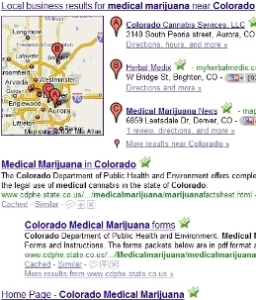
sign of the times
Colorado authorities tried the same thing five years ago, but a state judge slapped them down for failing to hold any hearings. They are also somewhat hamstrung because the measure passed as a constitutional amendment, making any alteration of it constitutionally suspect.
The hearing comes as participation in Colorado's medical marijuana program has gone into overdrive. The number of registered patients is rapidly approaching 10,000, up from only 1,700 a few years ago. The number of physicians making medical marijuana recommendations is nearing 600. The number of dispensaries in the state has undergone a jump in recent months, and is now approaching 40.
If approved, the draft proposal from the Department of Public Health and Environment would put a real crimp in the Colorado medical marijuana boom. Two provisions of the proposal that are earning the most denunciations from patients and providers: One would tighten the definition of who qualifies as a licensed caregiver; the other would limit the number of patients a caregiver can provide for to five. There is currently no limit on the number of patients for whom a caregiver can grow or otherwise provide.
"There are two major problems with the proposal," said Denver attorney Warren Edson, one of the coauthors of the voter-approved constitutional amendment that legalized medical marijuana in the state. "The biggest problem is their redefinition to include the requirement that caregivers provide other services. The second biggest problem is the attempt to regulate a five patient limit."
"The proposed caregiver limit is a solution in search of a problem," said Mason Tvert, executive director of SAFER (Safer Alternatives for Enjoyable Recreation), which while concentrating on recreational use, also supports the state's existing medical marijuana program. "It would actually create several problems for the thousands of Coloradans whose doctors recommended they use marijuana to treat their debilitating conditions. Imagine walking into a pharmacy to pick up the medicine your doctor recommended, only to be turned away because it has already helped five people," he said.
"As if such a patient limit isn't ridiculous enough, these state bureaucrats have failed to provide even a single justification for why it's necessary," Tvert continued. "After all, pharmacies distribute countless medications that are potentially dangerous and frequently abused, whereas medical marijuana dispensaries distribute a substance less toxic and less addictive than beer."
The Department of Public Health and Environment indeed steadfastly refused to comment on its proposals. "The department's position will be outlined at a public hearing on July 20," was all it would say, which is a bit odd since the department's position is already outlined in the draft proposal set to be slammed on Monday.
Denver attorney Robert Correy has crafted an alternate to the department proposal (see it at the proposal link above), and is warning the board it would be wise to adopt his and not the department's. "My proposal would guard caregivers' anonymity, and was prompted by the murder of caregiver Ken Gorman," he said. "It would be much better for caregivers and patients, and it is much more consistent with the constitution than the health department proposal."
Adopting the health department proposal would amount to amending the constitution, said Correy. "While the Health Board can pretty much vote independent of what the public wants, it can't amend the constitution through regulation, which is what this proposal would do. The changes are radical and diametrically opposed to the constitutional definitions of caregivers and patients' rights," he argued.
The Monday hearing was originally set for March, but officials rescheduled it when it became apparent that the controversial proposals would draw a huge number of people wanting to offer public comments on it. Now, it has been relocated to Denver college campus conference room that can fit 500 people, but medical marijuana supporters say that may not be enough.
One person who will be there is Jim Bent, co-owner of the Patients Choice dispensary on South Broadway in Denver, which provides for some 300 patients. "I'll be handing out bottled water and snacks to help people stay there through the day so the board can see the level of support the current approach has," he said.
"If those proposed rules went into effect, I would have to lay off employees," said Bent, "We wouldn't be able to provide the services we currently do," which currently include massage therapy, music therapy, acupuncture, and nutrition classes. "With so many patients, we can get a discount rate, but if we were only taking care of five people, as the proposal recommends, we couldn't afford to do that."
Patients Choice is a shining example of the wave of dispensaries that have opened in Colorado since the Obama administration made it clear that it was not going to sic the DEA on medical marijuana providers operating in accord with state laws. More than 30 dispensaries have opened this year, transforming the face of medical marijuana in the Rocky Mountain state.
"When Obama said he would leave this alone, we had a shift from people in the black market trying to squeeze over," said Edson. "But now it is business people running real businesses. Thanks to Obama and the poor state of the rest of the economy, this is really snowballing. We added 1,200 patients and four big dispensaries in May alone."
Patients and providers are of the opinion that if it ain't broke, don't fix it, said Edson. "We have a system that is working, and I think the Board of Health is going to find out Monday that there will be a thousand people there telling them not to approve those changes," he said.
That would be a clear sign of the importance of the existing program for patients and providers, he said. "The board has never had more than a dozen people at its hearings for anything, but when they had 200 people show up for the pre-hearing earlier this year, that was a loud signal. Now, they've rescheduled in a room that holds 500, and that isn't going to be enough. They are supposed to go by public opinion, and public opinion will be incredibly lopsided telling them not to adopt these changes," Edson warned.
If, in the face of the expected near universal condemnation of the proposal, the Health Board members adopt it, Robert Correy will be waiting for them. "I will be ready to serve them with the lawsuit in person right after the vote," he vowed. "We'll be in court Tuesday morning before the same judge who slapped them down when they tried this in 2004."
back to top
Phillip S. Smith, Writer/Editor
"This Is Your Country on Drugs" is a welcome addition to the drug literature. With it, author Ryan Grim has produced an entertaining, enlightening, and accessible account of America's love-hate relationship with psychoactive substances ranging from the nation's beginnings to the present day.
The book begins with a conundrum that inspired then college student Grim to turn his personal recreational interest in drugs into an exploration of their role in society and society's response to them. As a young man shortly after the turn of the millennium, Grim noticed that LSD had vanished from the scene. Why? he asked. You'll find the answer in the book. [Hint: Remember the Kansas missile silo LSD bust a few years ago?]
From there, Grim is off to the races, taking the reader on a wide-ranging tour of America on drugs. Grim leaps from the LSD shortage of the '00s to the drinking habits of the antebellum years, the rise of the temperance movement, and the subsequent decline in alcohol consumption -- which, not surprisingly, was accompanied by the first wave of opium use in the mid-19th Century.
That should have been an early lesson about the unintended consequences of prohibitionist policies, but of course, it wasn't. Not only did altered consciousness-hungry Americans find a substitute for booze in opium pills and preparations at mid-century, but they did so again in the 1890s, as alcohol prohibition sentiment strengthened, setting the stage for the first "modern" drug "epidemics."
It is, as Grim demonstrates, a lesson that has been repeated over and over again, but remains unlearned. After the government cracked down on cocaine early last century, lo and behold, amphetamine use started taking off. After it cracked down on amphetamines around 1970, lo and behold, cocaine made a comeback. With the war on cocaine and declining social acceptability, what should pop up but methamphetamine?
Grim also untangles the unintended consequences of Nixonian and Reaganite anti-drug efforts, both of which helped lay the groundwork for the emergence of the Mexican drug trafficking organizations, the so-called cartels, which are so bloodily newsworthy these days. Nixon's attempted crackdown on Mexican marijuana nudged smugglers to shift to cocaine, and Reagan's crackdown on Caribbean cocaine trafficking into Miami merely shifted the smuggling routes from sea to land, from the Caribbean to Mexico. Less than 20 years after that, we confront on the border the Frankenstein's monster that is the cartels.
If there is any question about it, "This Is Your Country on Drugs" makes eminently clear that Americans like getting high -- and always have. Drawing on a wide variety of sources from primary documents to government drug warriors, Grim provides an episodic history of drug use in America that is going to be eye-opening for most readers, and even had a few surprises for the crusty old drug historian, yours truly. Who knew that opium imports were rising as alcohol consumption was declining in the 1830s?
"This Is Your Country on Drugs" is less a polemic than a social history, although Grim makes clear that he thinks prohibition is a waste of time. "Prohibition helps create the very conditions that make prohibition ineffective," he writes, explaining that the decentralized nature of drug markets makes snagging the little fish much, much easier than catching the big one.
The book is also up-to-the-minute. It covers the rise of medical marijuana, the "methedemic" of the 1990s (he notes, interestingly, that a good sign a drug "epidemic" is coming to an end is that the mass media breathlessly announces its beginning), and the rising popularity of salvia, ayahuasca, and other psychedelics this decade.
I fear I haven't done the book justice, haven't mentioned enough of what Grim covers. You will have to buy this book, read it yourself, and let me know. You're sure to learn something if you do.
back to top
There is talk of marijuana legalization in the air, talk about sentencing reform, talk about second chances for drug offenders. But despite all the talk, the drug war rolls on, and the day-to-day grind of it can be a deadly business. So far this month, police officers enforcing the drug laws have killed at least four people.
None of the cases below is an obvious case of police misconduct, although the judgment of some of the officers involved can certainly be questioned. The departments to which the officers involved belong stand behind their men. But four people are dead after having encountered police officers doing drug war business, and at least one of them was not even the target of the cops.
In New York City, Shem Walker, 49, was shot and killed by an NYPD undercover officer Saturday night on his own stoop. The officer was part of a team of narcs, and was standing on Walkers' stoop to provide backup for a narc doing a buy-and-bust at a bodega a couple of doors down the street. Walker went outside to have a cigarette, encountered the undercover officer, told him to get off his porch, then got into a scuffle with him and a second narc standing on the stoop next door. Walker died lying in front of his house after taking a bullet to the chest.
"He said, 'Mommy, I'm going out for a smoke.' That was the last time," Walker's mother Lydia Walker said as she sat in her wheelchair Sunday morning before breaking down. "My son was the peacemaker," she said. "He wasn't involved in no violence. He always tried to make peace."
Walker's sister, Audrey Nurse said he was only trying to protect the family home. "Mind you, guys hang out on our front steps and my brother was always chasing them off. That's the only thing anyone can say about my brother. He comes and takes care of my mother. He is a peaceful guy. This is ridiculous."
In Gwinnett County, Georgia, an as yet unnamed man was shot and killed in a predawn drug raid on July 1. According to police, Gwinnett County police officers entered the home after knocking and announcing their presence, only to be met by a man pointing a gun at them. They shot him dead. Another man at the residence was arrested on a cocaine trafficking warrant, but it was not clear if any drugs were recovered at the scene.
Outside Holden, Louisiana, Donel Adam Stogner, 42, died after being choked by a deputy who was trying to force him to spit out a bag of suspected dope. The incident took place in the predawn hours on Sunday, July 5, when Livingston Parish Deputy Chris Sturdivant pulled Stogner over for weaving in traffic on I-12. The entire 8-minute encounter captured on the deputy's dash cam can be viewed here.
The encounter begins with the deputy asking Stogner for his driver's license, then asking Stogner what he has in his right hand. "I don't have nothing in my hand," says Stogner. "I swear to you."
But the tape appears to show Stogner placing something in his mouth. "Spit it out," the deputy yells, as he attempts to handcuff Stogner and he resists, if not exactly passively, also not aggressively. Stogner never strikes the deputy although the deputy strikes him repeatedly. Still, the deputy was unable to cuff Stogner until more deputies arrived on the scene. Shortly after their arrival, one deputy asks another, "Is he breathing?" He wasn't.
Stogner had been arrested for methamphetamine possession a week earlier. Preliminary coroner reports found meth in his system and concluded that he had died of severe coronary artery disease, an enlarged heart, and a fracture of the hyoid bone in his neck. The coroner ruled the death accidental, and Livingston Parish law enforcement said Deputy Sturdivant acted appropriately.
In Marrero, Louisiana, just six days later, Demarco Washington, 33, was shot and killed after a car chase following a drug investigation. Undercover deputies attempted to stop him, but he fled in his vehicle. Marrero was wanted on drug warrants, and collided with a police cruiser before driving away across lawns. According to deputies, Washington then exited his vehicle and pointed a gun at them. They shot him, and he was pronounced dead at the scene. Washington had previously been arrested for armed robbery, illegally carrying weapons, burglary, marijuana possession, distribution of drugs within 1,000 feet of a school, and battery on a police officer.
One man protecting his front porch, one man in the all-too-familiar predawn drug raid scenario, one man possibly trying to avoid another meth arrest, one man desperate to avoid going back to jail -- all dead. And let us not forget the police officers. How does Deputy Sturdivant feel knowing he choked a man to death to try to make a nickel and dime drug bust? How does the NYPD narc feel knowing he shot a man to death who was only trying to shoo thugs off his porch?
The drug war grinds on, and the toll isn't always measured in arrests, seizures, or prison sentences.
back to top
The US House of Representatives Thursday passed the District of Columbia appropriations bill and in so doing removed an 11-year-old amendment barring the District from implementing the medical marijuana law approved by voters in 1998. Known as the Barr amendment after then Rep. Bob Barr (R-GA), the amendment has been attacked by both medical marijuana and DC home rule advocates for years as an unconscionable intrusion into District affairs.
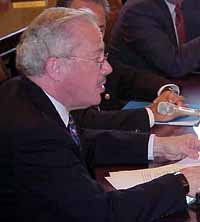
Bob Barr, lobbied to repeal anti-medical marijuana legislation he wrote
Ironically, Barr, who was defeated in a Republican primary in 2004 in part because of his opposition to medical marijuana, has become an advocate of drug law reform -- including for repeal of his amendment. He has done stints with both the ACLU and the
Marijuana Policy Project.
"Today represents a victory not just for medical marijuana patients, but for all city residents who have the right to determine their own policies in their own District without federal meddling," said Aaron Houston, MPP director of government relations. "DC residents overwhelmingly made the sensible, compassionate decision to pass a medical marijuana law, and now, 10 years later, suffering Washingtonians may finally be allowed to focus on treating their pain without fearing arrest."
With Republicans in control of the House until 2006, Congress had reapproved the Barr amendment in every DC appropriations bill until this year. But even under Republican control, pressure had begun to mount after the 2004 death of DC resident Jonathan Magbie, a quadriplegic medical marijuana user who was arrested and died in a DC jail for lack of adequate medical care.
"Had the District been able to implement its medical marijuana law when it passed in 1998, Mr. Magbie may well be alive today -- and free to treat his pain as he and his doctor saw fit," Houston said. "Perhaps now nobody in the District will ever have to suffer as he and his family did simply for using the medicine that works best for them."
back to top
The longstanding ban on use of federal AIDS grant funds to support needle exchange programs will soon be history, if the Subcommittee on Labor, Health and Human Services of the House Committee on Appropriations has its way. Led by Rep. David Obey (D-WI), the subcommittee left the language which has imposed the ban these many years out of the new bill. According to Obey's office:
This bill deletes the prohibition on the use of funds for needle exchange programs. Scientific studies have documented that needle exchange programs, when implemented as part of a comprehensive prevention strategy, are an effective public health intervention for reducing AIDS/AIV infections and do not promote drug use. The judgment we make is that it is time to lift this ban and let State and local jurisdictions determine if they want to pursue this approach.
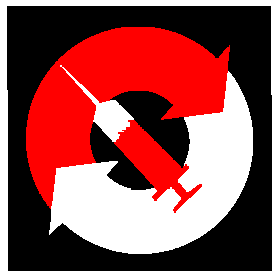
popular needle exchange logo
The vote followed a
protest at the US Capitol in which 26 AIDS activists chained themselves together in the Capitol Rotunda earlier in the day.
President Obama pledged during his primary campaign to eliminate the ban. Legislation allows the president to do so if certain scientific findings are made, specifically that needle exchange programs do not increase community drug use levels, and do reduce the spread of HIV. These findings were made long ago, and the Clinton administration acknowledged them, but declined to eliminate the ban. Earlier this year the Obama administration punted the issue to Congress by including the ban in its budget proposal while verbally expressing support for needle exchange. Whether Obey's subcommittee took action because of administration support, or despite a lack of administration support, I don't know. Perhaps a greater savant than I will enlighten us.
Now the bill heads to the full committee, after which it will go to the floor of the House of Representatives. Drug warriors may try to add the ban back at either stage. Victory also depends on what happens on the Senate side. Assuming the House and Senate do not approve exactly identical Labor and HHS budgets, it will go to a conference committee that includes both Reps and Senators.
Elimination of the ban will neither increase nor decrease the amount of money the federal government spends on AIDS prevention, at least not directly. What it will do is allow state governments who receive federal AIDS grants to choose whether or not to spend some of that money on needle exchange. Those states which are in the habit of using scientific evidence to guide their policies will undoubtedly support needle exchange.
back to top
It's a corrupt cops twofer for New Jersey, another twofer for Indiana, a two-for-one special on Texas deputies, and a lone prison guard in Florida. Let's get to it:
In Bridgeton, New Jersey, a Cumberland County Jail guard was arrested Saturday for trading drugs to inmates in return for money and sex. Corrections Officer Sergey Udalovas, 52, was charged with aggravated sexual assault against a female prison visitor, with whom he had sex in return for smuggling drugs in to her jailed friend. He is also charged with possession of marijuana and possession of heroin with intent to distribute. He is currently in the Atlantic County Jail on $175,000 full-cash bail.
In Irvington, New Jersey, a New Jersey Transit police officer was indicted last Friday on charges of official misconduct, drug possession with intent to distribute, and possession of a gun during a drug offense. Sgt. Barrington Williams, 47, had been arrested last July when detectives stopped his vehicle and found 3.7 pounds of marijuana, $3,600 cash, and his service weapon. Williams, a 13-year veteran of the force, has been suspended without pay. He is out on bail.
In Westville, Indiana, an Indiana Department of Corrections guard was arrested July 7 when she arrived for work at the Westville Correctional Facility. Both the Indiana State Police and the prison's Internal Affairs Division were involved in the investigation and arrest. Guard Karen Gibson, 27, is charged with one felony count of drug trafficking. If convicted, she faces two to eight years in prison. She was last reported in jail trying to make bail.
In Indianapolis, a former Indianapolis Metropolitan Police Department officer was sentenced July 9 to 10 years in federal prison for ripping off marijuana dealers and reselling their wares. Former officer James Davis, 34, was convicted last month of drug possession and conspiracy to distribute. He was one of three officers indicted by a federal grand jury in the scheme, which included one "raid" where they ripped off five pounds of pot and $18,000 in cash. His two partners, Jason Edwards and Robert Lear, were convicted earlier and await sentencing.
In Lubbock, Texas, two Hockley County sheriff's deputies were arrested last Friday as part of a 110-count federal indictment aimed at the Aces and Eights outlaw motorcycle gang for a methamphetamine trafficking conspiracy. Deputies Gordon Bohannon and Jose Quintanilla are accused of providing gang members with information that hurt efforts to shut down the conspiracy. They and the other 28 defendants are all charged with conspiracy to distribute and possess with intent to distribute 500 grams or more of meth, which carries a mandatory minimum 10 year prison sentence. Other defendants face additional charges.
In Sebring, Florida, a Florida prison guard was arrested last Friday for planning to smuggle drugs into the prison. Richard Pillajo, 37, thought he was conspiring with an inmate's family, but was actually talking to a Highland County Sheriff's office undercover officer when he agreed to purchase 112 grams of marijuana, 29 grams of cocaine, and 20 hydrocodone tablets and smuggle them into the Avon Park Correctional Institute in exchange for $2,500. He was charged with possession of an opium derivative with intent to sell, distribution of marijuana, trafficking in cocaine, smuggling contraband into a prison facility, and possession of narcotic equipment. At last report, he was in the Highlands County Jail trying to make a $50,500 bond.
back to top
In a Monday letter to US Secretary of State Hillary Clinton, the human rights group Human Rights Watch called on the Obama administration not to release tens of millions of dollars of drug war aid under the Mérida Initiative to Mexico. The letter says the aid should be blocked unless and until Mexico allows soldiers accused of human rights abuses in the drug war there to be tried in civilian -- not military -- courts.
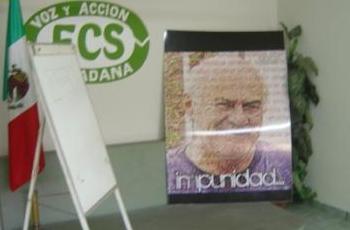
poster of assassinated human rights advocate Ricardo Murillo
Under the Mérida Initiative, designed to support Mexican President Felipe Calderón in his effort to suppress the country's powerful and violent drug trafficking organizations, the so-called cartels, the US is providing $1.4 billion over three years. But under the terms of the enabling legislation, the US government must withhold 15% of the aid unless the State Department certifies that Mexico is meeting certain human rights conditions. One of them is that civilian authorities investigate and prosecute abuses committed by troops and federal police "in accordance with Mexican and international law." The amount in question this year is about $100 million.
Calderón has enlisted the Mexican armed forces into his war against the cartels, and some 45,000 troops have been deployed to violence-wracked cities and drug producing regions in a bid to clamp down on traffickers. But at the same time, complaints of human rights violations by the military -- from unlawful entry and theft to kidnapping, rape, torture, and murder -- have been on the increase. The Human Rights Watch letter referred to a "rapidly growing number of serious abuses."
Of course, the Mexican military is not the only player engaged in behavior that violates human rights. More than 12,000 people have been killed in Calderon's war, most of them members of the various cartels killed by rival traffickers, often after having been kidnapped and tortured. Hundreds of Mexican and police have also been killed by the traffickers, including at least 12 federal police officers kidnapped, tortured, and killed, their bodies left beside a road in Michoacán over the weekend.
The State Department's certification (or not) of Mexico as complying with Mérida Initiative human rights conditions is due later this summer.
back to top
The Associated Press reported Wednesday that US and Colombian negotiators are nearing agreement on a plan to expand the US military presence in Colombia by allowing the US to base hundreds of Americans at a Colombian Air Force Base in the Magdalena River valley to support US anti-drug interdiction missions. A fifth and final round of talks later this month could seal the deal.

anti-Plan Colombia poster (courtesy Colombia IndyMedia)
The base would take up the drug war slack left by the ending of interdiction operations from the international airport at Manta, Ecuador, which is set for this week. The Manta base had been home for some 220 Americans supporting E-C AWACS and P-3 Orion surveillance planes scouring northern South America and the eastern Pacific for vessels and planes they suspect are carrying drugs. But Ecuadoran President Rafael Correa refused to renew the US lease, saying the US military mission there violated his country's sovereignty.
Colombian officials told the AP the plan was to make Colombia a regional hub for Pentagon operations. The current draft of the plan, they said, would allow more frequent visits by US aircraft and warships to two naval bases and three air bases in Colombia, with the Palanquero air base being the centerpiece of the plan. Palanquero had been off limits to US forces until April for human rights reasons -- a Colombian military helicopter operating from Palanquero had killed 17 civilians in 1998.
But that's ancient history now. A bill already passed by the House and pending in the Senate would earmark $46 million for new construction at the base, which is home to the Colombian Air Force's main fighter wing. That funding would be released 15 days after an agreement is reached.
Colombian President Alvaro Uribe is one of America's few remaining staunch allies in the region, and acceptance of the base deal could further stress already strained relations between Colombia and its more left-leaning neighbors Ecuador and Venezuela. It's also certain to raise concerns about Latin Americans wary of US interventions in the region.
Such concerns are not helped by Pentagon planning documents that suggest that beyond its anti-drug mission, Palanquero could be a "cooperative security location" from which "mobility operations could be executed." In other words, a jumping off point for US military expeditionary forces.

coca eradication
The US has pumped several billion dollars of primarily military and police assistance into Colombia since Plan Colombia began in 1999. Originally defined as a purely anti-drug program, under the Bush administration, it took on the additional burden of counter-insurgency, defining the rebel FARC guerrillas as narco-terrorists who must be defeated.
Despite all those billions of dollars in anti-drug aid, Colombia remains the world's largest coca and cocaine producer. Neighboring Peru is second, and Bolivia is third. Bolivia under President Evo Morales also forms part of the emerging left-leaning bloc in Latin America.
Former Colombian defense minister Rafael Pardo, who is running for president in the May 2010 elections, told the AP that the radar and communications interception ability of US surveillance planes extends well beyond Colombia's borders and could cause problems with its neighbors.
"If it's to launch surveillance flights over other nations then it seems to me that would be needless hostility by Colombia against its neighbors," Pardo said.
back to top
The Obama administration has shifted gears in Afghanistan, rejecting the Bush administration's emphasis on opium poppy eradication in favor of attacking Taliban-linked drug trafficking networks as it increases the number of US military personnel in the country to nearly 70,000. Along with that increase in American servicemen and women in Afghanistan, the administration is also ramping up the DEA presence in the country.
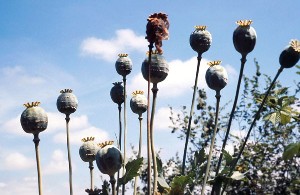
opium poppies (incised papaver specimens)
The number of DEA agents in the country will increase five-fold this year, according to a report in the
Baltimore Sun. The agency currently has 13 agents in Afghanistan; that number will jump to 68 by September and 81 by 2010. An unspecified number of additional agents are also being sent to Pakistan, through which a large portion of the Afghan drug trade flows.
Afghanistan produces more than 90% of the world's opium poppy supply, from which heroin is derived. One province now in the sights of a 4,000 strong US Marine expeditionary force, Helmand province, by itself produces more than half of all Afghan opium and if it were its own country, would be the world's largest opium supplier.
While all factions in Afghanistan have their fingers in the poppy pie, including numerous officials and warlords linked to the Karzai government, the US and NATO are especially interested in disrupting those portions of the drug trade that help finance the Taliban insurgency. The Taliban is estimated to make hundreds of millions of dollars a year from taxing poppy crops, acting as armed escorts for drug caravans, and running international drug trafficking operations.
In the past, the Taliban has benefitted from eradication campaigns in at least two ways. First, to the extent such campaigns are successful, they drive up the price of opium, which the Taliban has abundantly stockpiled. Second, the eradication campaigns have proven a fertile recruiting tool for the Taliban as farmers angry at seeing their livelihoods destroyed look to join those who ostensibly oppose eradication.
back to top
The Hawaii legislature Wednesday voted to override Republican Gov. Linda Lingle's veto of a bill that would establish a task force to examine problems and critical issues surrounding the state's medical marijuana law. Legislators voted to enact the bill, SB 1058, by a margin of 25-0 in the Senate and 38-9 in the House.

Volcano National Park, Hawaii Island
Hawaii became the first state to legalize medical marijuana through the legislative process when it passed its law in 2000. But patients and providers have complained over the years about various aspects of the law -- the program's administration by law enforcement instead of health officials, for example -- and have been urging the legislature to take a second look.
Now it will. Under the bill, the task force will:
- Examine current state statutes, state administrative rules, and all county policies and procedures relating to the medical marijuana program;
- Examine all issues and obstacles that qualifying patients have encountered with the program;
- Examine all issue and obstacles that state and county law enforcement agencies have encountered with the program;
- Compare and contrast Hawaii's program with all other state programs; and
- Address other issues and perform any other function necessary as the task force deems appropriate, relating to the program.
back to top
A CBS News poll conducted over the weekend has found that 41% of Americans support marijuana legalization, while 52% oppose, and 7% are undecided. The figure matches that of a January CBS News poll. Support dropped to 31% in an April CBS News poll before rebounding this month.
The figure is in line with other recent public opinion polls on the topic. A February Rasmussen Reports poll had support for legalization at 40%, a February Zogby poll had support for legalization at 44%, and an April ABC News/Washington Post poll found 46% supported "legalizing the possession of small amounts of marijuana for personal use." The high-end outlier is an April Zogby poll with 52% saying marijuana should be "legal, taxed, and regulated."
In the latest CBS News poll, there was bare majority support for legalization among people under 35 (52%) and liberals (55%), the only regional, demographic, or political groups where majorities supported legalization. Support was higher among men (44%) than women (39%) and higher in the West (46%), Northeast (44%), and the Midwest (43%) than in the South (35%).
The latest CBS News poll was conducted among a random sample of 944 adults nationwide via telephone interviews. The margin of error for the entire sample is plus or minus three percentage points.
The polling comes as attention is focused on marijuana legalization like never before. But it suggests that despite decades of effort, the marijuana reform movement is not quite to the Promised Land yet.
back to top
Last week, 136 people died in the Indian state of Gujarat after drinking tainted alcohol, and the incident has stirred debate over the state's alcohol prohibition policy, in existence since 1960. One of India's "liquor barons" has invited the state government to do away with prohibition, and the state government has invited him to shut up about it.

moonshine still (courtesy Hagley Library)
The deaths occurred in Ahmedabad, about 35 miles from the state capital, Gandhinagar. Most of the dead were common laborers who had allegedly purchased illicit liquor produced or distributed by one Vinod Dagri, currently a fugitive, and described in local media as "the key mastermind in the hooch tragedy case."
It's not the first time contaminated black market alcohol has killed people in Gujarat. And as Gujarat officials were quick to point out, moonshine deaths also occur in Indian states without alcohol prohibition. In a Monday statement, Gujarat government spokesperson Jaynarayan Vyas noted that tainted alcohol had killed 31 people in Kerala in October 2000, 10 were killed and four blinded by bad hooch in Bhubaneswar in February of this year, 13 people died in of bad booze in Kolkata in May 2008, and 142 people in Karnataka had died from illicit liquor over the course of last year.
[Ed: Deaths from tainted alcohol in states that don't have prohibition are comparable to those in Gujarat, only because people in those states have access to alcoholic beverages that were legally produced, then smuggled into their states. If alcohol prohibition were to become more widespread, or nationwide, legally produced alcohol would become a scarcer commodity, and tainted alcohol would likely cause proportionally many more deaths in places like Kerala or Kolkata or Karnataka than it does today.]
Still, Vijay Mallya, chairman of the UB Group, India's largest liquor conglomerate, couldn't resist taking the opportunity to jab at the state's political leadership for its adherence to prohibitionist policies. Mallya offered to help the state craft a "responsible alcoholic beverages policy" in a statement cited in the Hindustan Times. "The deaths are not only tragic but should serve as a wake-up call to our political hypocrites. [Gujarat Chief Minister] Narendra Modi knows full well that every brand of alcohol is available in Gujarat," Mallya said. "The farce of prohibition, which cannot be enforced, leads to illegal, unhygienic and unsupervised production of deadly cocktails which claim innocent lives. It is time that political masters face reality in the interests of people's health," he added.
Minister Modi was not amused. "Many elements are giving the tragic incident political color and are trying to ruin the peaceful atmosphere in Gujarat," he said. "My government is sincere about eliminating the vice of illicit liquor."
State Health Minister Jay Narayan Vyas also suggested that Mallya butt out. "This is an internal matter of the Gujarat government and Mr. Mallya should avoid making suggestions on what should be done in Gujarat," Vyas told reporters in Gandhinagar.
Early this week, the Gujarat government was standing firm. "There is no question of any rethink on easing or lifting the prohibition laws," Vyas said on Monday. "The government is committed to implementing the prohibition laws for the peace, prosperity and security of the people of Gujarat."
back to top
July 18, 1956: The Narcotics Control Act/Daniel Act is passed, establishing mandatory minimum sentences for drug offenders.
July 17, 1980: Financed by wealthy ranchers and drug lords under Roberto Suarez Gomez, the "Cocaine Generals" of the Bolivian "cocaine coup" seize power. Within months it is learned that Pierluigi Pagliai and Stefano Delle Chiaie were right-wing Propaganda Due (P-2) terrorists with suspected kills on three continents and Klaus Altmann was none other than fugitive Nazi war criminal Klaus Barbie, the Butcher of Lyons. Barbie, who had sent hundreds of Jews to their deaths, had avoided prosecution when Americans in occupied Germany recruited him as an informer in 1947 and engineered his escape.
July 17, 1984: The Drug War and Cold War collide when the Washington Times runs a story detailing DEA informant Barry Seal's successful infiltration of the Medellin cartel's operations in Panama. The story was leaked by Oliver North and purported to show the Nicaraguan Sandinistas' involvement in the drug trade. Ten days later, Carlos Lehder, Pablo Escobar, Jorge Ochoa, and José Gonzalo RodrÃguez Gacha are indicted by a Miami Federal grand jury based on evidence obtained by Seal. In February 1986, Seal is assassinated in Baton Rouge, LA, by gunmen hired by the cartel.
July 23, 1985: Tulio Manuel Castro Gil, judge of the Superior Court of Bogota, Colombia, is assassinated as he climbs into a taxi, following his indictment of Pablo Escobar for the murder of Lara Bonilla.
July 20, 1995: The total number of US marijuana arrests since 1965 passes the 10,000,000 mark, according to an estimate by NORML.
July 22, 1997: Drug Czar General Barry McCaffrey says, "In the view of the nation's scientific and medical community, marijuana has a high potential for abuse and no generally accepted therapeutic value." He says this despite an editorial from the January 30, 1997 issue of the New England Journal of Medicine that states, "Federal authorities should rescind their prohibition of the medicinal use of marijuana for seriously ill patients and allow physicians to decide which patients to treat."
July 17, 2001: Madison, Wisconsin's Mayor Sue Bauman speaks out about the drug war in her State of the City address. She says: "As a city and as a society, we need to put more monies into prevention programs and thus fewer into policing and the criminal justice system... It is time that the nation, the state, the county and the City view drug and alcohol abuse as a public health problem. Unfortunately, the emphasis for years has been on a war on drugs -- an attempt to end drug usage and alcohol abuse by punishing the users/abusers. This is a failed strategy."
July 19, 2001: The Washington Post reports that a confidential informant for the Drug Enforcement Administration compromised dozens of prosecutions across the United States by falsely testifying under oath and concealing his own arrest record, but the DEA continued to employ him for 16 years despite detailed knowledge of his wrongdoing, according to interviews, court records and an internal report by the agency.
July 19, 2001: In conjunction with a two-day NIDA-directed Ecstasy conference, Senator Bob Graham (D-FL), introduces the "Ecstasy Prevention Act of 2001." An initial analysis by the Center for Cognitive Liberty & Ethics (CCLE) shows that this new bill, while giving lip-service to generating more scientific data about the health consequences of MDMA (Ecstasy), directs over 22 million dollars to increased law enforcement, media propaganda, and the creation of a new MDMA drug test.
July 21, 2004: The Multidisciplinary Association for Psychedelic Studies (MAPS), Prof. Lyle Craker, and Valerie Corral file lawsuits against the DEA, HHS, NIH, and NIDA for obstructing medical marijuana research.
back to top
Do you read Drug War Chronicle? If so, we'd like to hear from you. DRCNet needs two things:
- We are in between newsletter grants, and that makes our need for donations more pressing. Drug War Chronicle is free to read but not to produce! Click here to make a donation by credit card or PayPal, or to print out a form to send in by mail.
- Please send quotes and reports on how you put our flow of information to work, for use in upcoming grant proposals and letters to funders or potential funders. Do you use DRCNet as a source for public speaking? For letters to the editor? Helping you talk to friends or associates about the issue? Research? For your own edification? Have you changed your mind about any aspects of drug policy since subscribing, or inspired you to get involved in the cause? Do you reprint or repost portions of our bulletins on other lists or in other newsletters? Do you have any criticisms or complaints, or suggestions? We want to hear those too. Please send your response -- one or two sentences would be fine; more is great, too -- email [email protected] or reply to a Chronicle email or use our online comment form. Please let us know if we may reprint your comments, and if so, if we may include your name or if you wish to remain anonymous. IMPORTANT: Even if you have given us this kind of feedback before, we could use your updated feedback now too -- we need to hear from you!
Again, please help us keep Drug War Chronicle alive at this important time! Click here to make a donation online, or send your check or money order to: DRCNet, P.O. Box 18402, Washington, DC 20036. Make your check payable to DRCNet Foundation to make a tax-deductible donation for Drug War Chronicle -- remember if you select one of our member premium gifts that will reduce the portion of your donation that is tax-deductible -- or make a non-deductible donation for our lobbying work -- online or check payable to Drug Reform Coordination Network, same address. We can also accept contributions of stock -- email [email protected] for the necessary info.
back to top
Along with our weekly in-depth Chronicle reporting, DRCNet also provides daily content in the way of blogging in the Stop the Drug War Speakeasy -- huge numbers of people have been reading it recently -- as well as Latest News links (upper right-hand corner of most web pages), event listings (lower right-hand corner) and other info. Check out DRCNet every day to stay on top of the drug reform game! Check out the Speakeasy main page at http://stopthedrugwar.org/speakeasy.

prohibition-era beer raid, Washington, DC (Library of Congress)
Since last issue:
Scott Morgan writes: "Ethan Nadelmann Challenges NAACP to Oppose the Drug War," "The Mexican Drug War is Losing Public Support," "Man Tries to Swallow Drugs, Gets Choked to Death by Police," "Congress Slashes Funding for Anti-Drug Propaganda," "Pablo Escobar's Pet Hippos Are Still Alive (And Causing Big Problems)," "How to Win a Marijuana Debate on Television," "'The Potent Smell of Marijuana Legalization is In the Air'," "No One Takes the Drug Czar's Office Seriously (Not Even the President)" and "An Epidemic of Botched Drug Raids in Maryland."
Phil Smith offers: "I Was Turned Away Again Trying to Visit Medical Marijuana POW Will Foster in Jail Last Night," "New Hampshire Governor Vetoes Medical Marijuana Bill, A Handful of Additional Votes Needed to Override" and "I Visited Imprisoned Medical Marijuana Patient Will Foster in Jail Last Night."
David Borden celebrates: "Big News: House Subcommittee Approves Legislation Eliminating the Needle Exchange Funding Ban."
David Guard posts numerous press releases, action alerts and other organizational announcements in the In the Trenches blog.
Please join us in the Reader Blogs too.
Again, http://stopthedrugwar.org/speakeasy is the online place to stay in the loop for the fight to stop the war on drugs. Thanks for reading, and writing...
back to top
Want to help end the "war on drugs," while earning college credit too? Apply for a StoptheDrugWar.org (DRCNet) internship for this summer or fall semester and you could come join the team and help us fight the fight!
StoptheDrugWar has a strong record of providing substantive work experience to our interns -- you won't spend the summer doing filing or running errands, you will play an integral role in one or more of our exciting programs. Options for work you can do with us include coalition outreach as part of the campaign to rein in the use of SWAT teams, to expand our work to repeal the drug provision of the Higher Education Act to encompass other bad drug laws like the similar provisions in welfare and public housing law; blogosphere/web outreach; media research and outreach; web site work (research, writing, technical); possibly other areas. If you are chosen for an internship, we will strive to match your interests and abilities to whichever area is the best fit for you.
While our internships are unpaid, we will reimburse you for metro fare, and DRCNet is a fun and rewarding place to work. To apply, please send your resume to David Guard at [email protected], and feel free to contact us at (202) 293-8340. We hope to hear from you! Check out our web site at http://stopthedrugwar.org to learn more about our organization.
back to top











